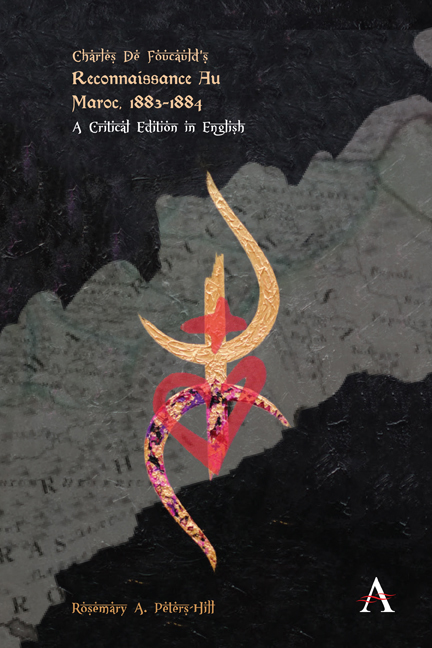Book contents
- Frontmatter
- Contents
- List of Figures
- Acknowledgments
- “There are no roads”: Charles de Foucauld’s Reconnaissance au Maroc—a Critical Introduction
- Charles de Foucauld, Reconnaissance au Maroc, 1883–1884
- Letter to François de Bondy
- Introduction
- Avant-Propos
- I Tangiers to Meknès
- II Meknès to Qaçba Beni Mellal
- III Qaçba Beni Mellal to Tikirt
- IV Tikirt to Tissint
- V Sojourn in the Sahara
- VI Tissint to Mogador
- VII Mogador to Tissint
- VIII Tissint to the Dadès
- IX The Dadès to Qçabi ech Cheurfa
- X Qçabi ech Chorfa to Lalla Maghnia
- Appendix: The Jews of Morocco
- Note on the Materials Used to Draw Up My Itinerary
- Report Delivered to the Société de Géographie de Paris in Its General Session of 24 April 1885
- “Itineraries in Morocco”
- Afterwards: An Afterword
- Glossary of Terms
- Bibliography
- Index
“There are no roads”: Charles de Foucauld’s Reconnaissance au Maroc—a Critical Introduction
Published online by Cambridge University Press: 20 January 2022
- Frontmatter
- Contents
- List of Figures
- Acknowledgments
- “There are no roads”: Charles de Foucauld’s Reconnaissance au Maroc—a Critical Introduction
- Charles de Foucauld, Reconnaissance au Maroc, 1883–1884
- Letter to François de Bondy
- Introduction
- Avant-Propos
- I Tangiers to Meknès
- II Meknès to Qaçba Beni Mellal
- III Qaçba Beni Mellal to Tikirt
- IV Tikirt to Tissint
- V Sojourn in the Sahara
- VI Tissint to Mogador
- VII Mogador to Tissint
- VIII Tissint to the Dadès
- IX The Dadès to Qçabi ech Cheurfa
- X Qçabi ech Chorfa to Lalla Maghnia
- Appendix: The Jews of Morocco
- Note on the Materials Used to Draw Up My Itinerary
- Report Delivered to the Société de Géographie de Paris in Its General Session of 24 April 1885
- “Itineraries in Morocco”
- Afterwards: An Afterword
- Glossary of Terms
- Bibliography
- Index
Summary
STRANGE it must appear that the account of perhaps the most celebrated and […] the most momentous voyage of discovery that has ever taken place […] has never before been given to the world in the very words of its great leader. It has fallen out in this wise.
— W. J. L. Wharton, Foreword to Captain Cook's Journal during His First Voyage Round the World Made in H.M. Bark “Endeavor” 1768–71 (1893)Writing Morocco: Pre(sup)positions of Place
Writing in Rabat in 1934–35, Roland Lebel opened his Les Voyageurs français du Maroc with the following claim: “On s’est attaché, dans cet ouvrage, à étudier l’exotisme marocain à travers les livres des voyageurs français qui ont visité le Moghreb ou qui y ont séjourné quelque temps” (I have set out, in this work, to study Moroccan exoticism through the writings of French travelers who have visited the Maghreb or lived there for some time). Lebel's point of departure provides an important perspective for much of the work that has represented Morocco—precolonial, as a protectorate, and then in the postcolonial era—that is, from the French, and therefore imperial, point of view. Even the opening of his first chapter stresses that his study will focus more on the French than on the Moroccan perspective: “Le Maroc apparaît dans notre histoire littéraire à peu près en même temps qu’il entre dans notre histoire politique” (Morocco appears in our literary history roughly at the same time as it enters our political history). The inclusive/exclusive dialectic, through Lebel's separation of the French from colonial others, his “nous,” emphasizes Morocco as an “othered” place and experience and reiterates both place and experience as not only outside the French frame of reference, but also secondary to it, something that can “appear,” an element that can “enter” the frame. Lebel's language bears out this mindset through word choices such as “curiosité” (curiosity, but in the imperial/colonial context often used to refer to a curio or artifact brought back from the exotic territory), “chez nous” (from our side), even “ce pays” (that country) with its quasi-dismissive demonstrative pronoun.
- Type
- Chapter
- Information
- Charles de Foucauld’s Reconnaissance au Maroc, 1883–1884A Critical Edition in English, pp. 1 - 72Publisher: Anthem PressPrint publication year: 2020



